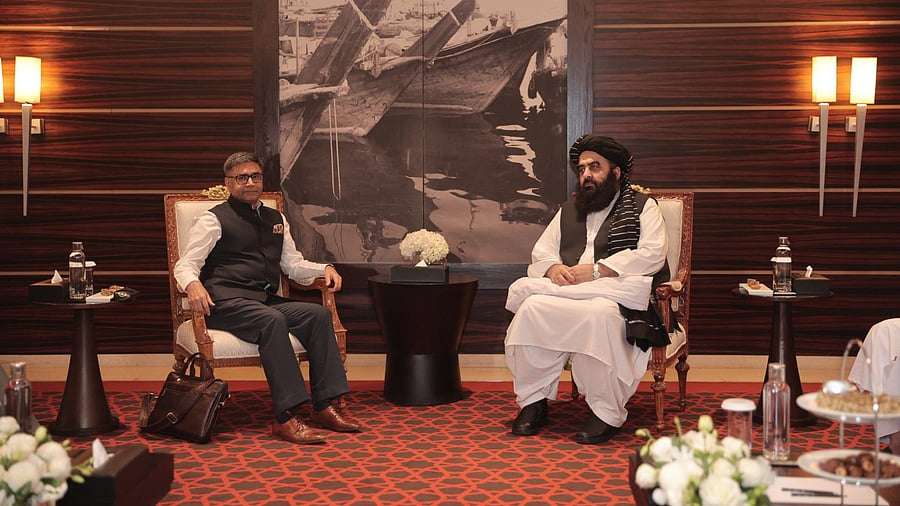
Foreign Secretary Vikram Misri met Acting Foreign Minister of Afghanistan Mawlawi Amir Khan Muttaqi in Dubai today.
Credit: X/@MEAIndia
New Delhi: India on Wednesday stepped up its engagement with the Taliban dispensation in Afghanistan by sending its top diplomat to Dubai to meet the acting foreign minister of the so-called ‘government’ the Sunni Islamist militia established after returning to power in the war-ravaged country in 2021.
Foreign Secretary Vikram Misri’s meeting with Amir Khan Muttaqi, the acting foreign minister of the Taliban’s government in Afghanistan, was the highest-level public engagement New Delhi had in 25 years.
The last one had taken place in December 1999, when then External Affairs Minister Jaswant Singh had a meeting with the Taliban government’s Foreign Minister Wakil Ahmed Muttawakil in Kandahar and handed over to him three terrorists to secure the release of the crew and the passengers of the hijacked Indian Airlines flight IC-814.
Muttaqi underlined the Taliban’s “sensitivities” to the security concerns of India. They agreed to remain in touch and continue regular contact at various levels, according to a press release issued by the Ministry of External Affairs in New Delhi after the meeting.
The meeting took place amid worsening relations between the Taliban and its former mentor Pakistan, which recently carried out airstrikes in Afghanistan.
The chief of Pakistan’s military spy agency, Inter-Services Intelligence, Gen M Asim Malik, recently met Tajikistan’s president Emomali Rahmon and purportedly discussed building up a new front against the Taliban.
Though New Delhi has not yet formally recognised the so-called government the Taliban set up after returning to power in Kabul on August 15, 2021, the press release issued by the Ministry of External Affairs of the Government of India referred to Muttaqi as the “Acting Foreign Minister of Afghanistan”.
Misri flew to meet Muttaqi in Dubai just two days after India condemned Pakistan’s airstrikes in Afghanistan. New Delhi dismissed Islamabad’s argument that the Pakistan Air Force carried out the strikes in the Paktika province of Afghanistan acting on the specific intelligence input about the hideouts of Tehreek-e-Taliban Pakistan across the Durand Line. Islamabad has been alleging that the TTP has been using its bases in Afghanistan to carry out a series of terror attacks in Pakistan.
New Delhi’s top diplomat informed the acting foreign minister of the Taliban that India would provide further material support in the first instance to the health sector and for the rehabilitation of refugees.
The two sides also discussed the ways to strengthen cooperation in sports, particularly cricket, as it is highly valued by the young generation of Afghanistan.
They also agreed to promote the use of Chabahar Port, which India now runs in Iran, to support the exporters and importers of Afghanistan, including humanitarian assistance.
Unlike in 1996, New Delhi did not formally shut down its embassy in Kabul after the return of the Taliban to power after two decades. It evacuated its envoy and other diplomats from Afghanistan in August 2021 but sent back a “technical team” less than a year later to run its mission in Kabul and coordinate the delivery of humanitarian aid – food and medicines – from India.
New Delhi had several rounds of engagements with the leaders of the Taliban in the past two years, the latest being the meeting between a senior diplomat of India and Afghanistan’s “acting defence minister”, Mullah Muhammad Yaqoob, the son of militia’s late founder Mullah Muhammad Omar, on November 6.
India’s outreach to the Taliban is apparently aimed at stopping its strategic rivals Pakistan and China from turning the Sunni Islamist group’s return to power in Afghanistan into an advantage.
The relations between Pakistan and Taliban-ruled Afghanistan, however, turned sour over the past two years. Islamabad blamed the Taliban regime in Kabul for the spurt in terrorist attacks in Pakistan.
Misri underlined during his meeting with Muttaqi India’s historic friendship with the Afghan people and the strong people-to-people contacts between the two countries. In this context, he conveyed India’s readiness to respond to the urgent developmental needs of the Afghan people, according to the MEA press release issued in New Delhi.
The two sides evaluated the ongoing Indian humanitarian assistance programmes. The Afghan minister appreciated and thanked the Indian leadership for continuing to engage and support the people of Afghanistan.
In view of the current need for development activities, it was decided that India would consider engaging in development projects in the near future, in addition to the ongoing humanitarian assistance programme, it added.
India has so far dispatched several shipments consisting of 50,000 MTs of wheat, 300 tons of medicines, 27 tons of earthquake relief aid, 40,000 litres of pesticides, 100 million polio doses, 1.5 million doses of Covid Vaccine, 11,000 units of hygiene kits for the drug de-addiction programme, 500 units of winter clothing and 1.2 tons of stationery kits, etc.
